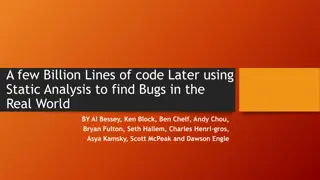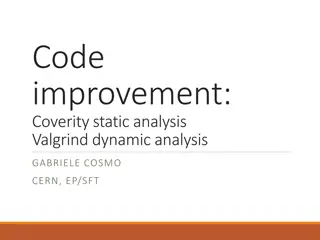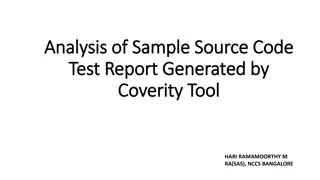
Introduction to Coverity Static Analysis Tool
"Learn about Coverity, a powerful static code analysis tool for C, C++, C#, Java, and JavaScript. Discover how Coverity detects various defect patterns such as memory corruptions, concurrency issues, security vulnerabilities, and more. Explore its capabilities in finding critical issues in open-source projects and specific examples from Linux. Uncover the power of Coverity's analysis in improving code quality and security."
Download Presentation

Please find below an Image/Link to download the presentation.
The content on the website is provided AS IS for your information and personal use only. It may not be sold, licensed, or shared on other websites without obtaining consent from the author. If you encounter any issues during the download, it is possible that the publisher has removed the file from their server.
You are allowed to download the files provided on this website for personal or commercial use, subject to the condition that they are used lawfully. All files are the property of their respective owners.
The content on the website is provided AS IS for your information and personal use only. It may not be sold, licensed, or shared on other websites without obtaining consent from the author.
E N D
Presentation Transcript
/15 Introduction to Static Analyzer
Introduction to Coverity 1 /15 Content Coverity Static Analysis Use cases of Coverity Examples C program 1 C program 2 Java program
Introduction to Coverity 2 /15 Coverity Static Analysis Coverity Static Analysis is a static code analysis tool for C, C++, C#, Java, and JavaScript Coverity Static Analysis is is derived from the Stanford Checker, a research tool for finding bugs through static analysis [from Wikipedia] Coverity Static Analysis detects dozens of defect patterns in the following categories Memory corruptions Concurrency Security Performance inefficiencies Unexpected behavior
Introduction to Coverity 3 /15 Power of Coverity Coverity can find critical issues such as: Memory corruptions API usage errors Memory illegal accesses Buffer overflows Path manipulation Concurrent data access violations Performance inefficiencies Cross-site scripting (XSS) Program hangs Cross-site request forgery (CSRF) Security misconfigurations Deadlocks SQL Injection Error handling issues Uninitialized members Integer overflows Control flow issues Integer handling issues Hard-coded credentials
Introduction to Coverity 4 /15 Coverity and Open Source Projects Coverity is providing a free service for open source projects 741 projects 2.5M LOC Coverity Scan 44,641 defects are fixed (Only 10.2% of identified defects are false positives in 2013)
Introduction to Coverity 5 /15 Coverity and Linux 18,103 defects are identified in Linux for 8 years (- 2013) 11,695 defects are fixed Linux defects fixed in 2013 Category Fixed 1,135 816 291 207 128 3 766 3,346 Memory illegal access, corruption Integer handling issues Null pointer dereferences Uninitialized variables Resource leaks Concurrent data access violations Others Total http://softwareintegrity.coverity.com/rs/coverity/images/2013-Coverity-Scan-Report.pdf http://events.linuxfoundation.org/sites/events/files/slides/2013_10_16_sent.pdf
Introduction to Coverity 6 /15 How To Analyze a program with Coverity Configure coverity cov-configure --config [configure file] --[gcc | msvc | java] Build with coverity cov-build --dir [output directory] --config [configure file] [compile command] Analyze cov-analyze --dir [output directory] --all --aggressiveness-level high Commit analyzed results to server cov-commit-defects --dir [output directory] --host [server host] --stream [stream name] --user [id] --password [password] 1. 2. 3. 4. $ cov-configure --config gcc.config --gcc $ cov-build --dir output --config gcc.config gcc example1.c $ cov-analyze --dir output --all aggressiveness-level high $ cov-commit-defects --dir output --host localhost--stream cs453stream --user cs453 --password 1234
Introduction to Coverity 7 /15 Manage Analyzed Results in Web Interface Bug list Bug description Bug detail
Introduction to Coverity 8 /15 Example1 - Target C source code 1. //example1.c 2. #include <malloc.h> 3. #include <stdio.h> 4. #include <string.h> Bugs in this code Null pointer dereference Infinite loop Format String Bug Resource Leak Negative Array Index Ignoring number of bytes read 5. void f() { 6. 7. 8. 9. 10. 11. 12. 13. 14. 15. 16. 17. } char* mem = NULL; int length; char buf[100]; // file descriptor 0 is connected to keyboard read(0, &length, sizeof(int)); int r = read(0, &buf, length > 100 ? 100 : length); mem = malloc(r + 1); buf[r] = 0; strcpy(mem, buf); printf(mem); fflush(stdout); 18. int main() { 19. while (1) 20. 21. } f();
Introduction to Coverity 9 /15 Example1 Null pointer dereference malloc() may return null if it fails to allocate a memory (line 12) e.g.) malloc(0) e.g.) malloc(BIG_NUMBER) Execution sequence that triggers the bug Attempt to write a data to mem (NULL)
Introduction to Coverity 10 /15 Example1 Format String Bug User input is directly used for the first argument of printf() (line 15) User can inputs arbitrary format strings such as printf( %s ) and printf( %n ) without second argument The program considers a garbage memory value is a second argument This bug causes information leakage or remote code execution vulnerability
Introduction to Coverity 11 /15 Example1 Resource Leak mem is not freed although the mem goes out of scope (line 17) Not freed Out of scope of mem
Introduction to Coverity 12 /15 Example1 Negative Array Index read() (line 11) can return negative number if it fails to read The return value is used for array indexing (out of index)
Introduction to Coverity 13 /15 A Missing Bug Case in Example 1 1. //example1.c 2. #include <malloc.h> 3. #include <stdio.h> 4. #include <string.h> If a user inputs -1 for length variable (line 9) (length > 100) is false (line 10) 5. void f() { 6. 7. 8. char* mem = NULL; int length; char buf[100]; read() receives -1 as a third argument (line 10) The type of the third argument of read() is unsigned integer type -1 is converted to 0xffffffff read an input to buf more than 100 bytes (line 10) Stack overflow 9. 10. 11. 12. 13. 14. 15. 16.} read(0, &length, sizeof(int)); int r = read(0, &buf, length > 100 ? 100 : length); mem = malloc(r + 1); buf[r] = 0; strcpy(mem, buf); printf(mem); fflush(stdout); 17.int main() { 18. while (1) 19. 20.} f();
Introduction to Coverity 14 /15 Example2 - Target C source code 1. //example2.c 2. #include <stdio.h> Bug in this code Copy & paste error 3. int main(int argc, char** argv) { 4. int num1=0, num2=0; 5. 6. 7. if (argc >= 2) { int n1 = atoi(argv[1]); int n2 = atoi(argv[1]); 8. 9. 10. 11. if (n1 >= 0 && n1 <= 100) num1 = n1; else num1 = 5; 12. 13. 14. 15. 16. 17. 18.} if (n2 >= 0 && n2 <= 100) num2 = n1; else num2 = 5; } printf("%d %d", num1, num2);
Introduction to Coverity 15 /15 Example2 - Target C source code Copy-paste mistakes also can be detected n1 (line 17) may be relevant to be n2
Introduction to Coverity 16 /15 Example3 Target Java Source Code There exists a bug in this Java source code Race Condition 3 methods Synchronized add and remove methods (line 6, 9) A getter method (line 12) 6. 7. 8. 9. 10. 11. 12. 13. 14. 15. } 1. // Example3.java 2. import java.util.*; 3. public class Example3 { 4. 5. private final Object guardingLock = new Object(); private List<Object> data = new ArrayList<Object>(); public void addData(Object o) { synchronized(guardingLock) { data.add(o); } } public void removeData(Object o) { synchronized(guardingLock) { data.remove(o); } } public Object guardedByViolation(int i) { return data.get(i); } [from coverity example]
Introduction to Coverity 17 /15 Example3 Race Condition Context switching can happens while executing get() method (line 15)



